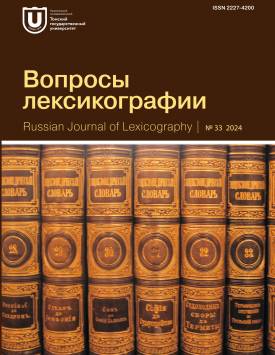Biblical expressions of the East Slavic languages in a comparative lexicographic representation
The article presents the concept of a comparative dictionary of biblical expressions of the East Slavic languages. The dictionary research project is being implemented by the members of the phraseological seminar of St Petersburg University under the guidance of Professor Valery Mokienko. The purpose of the designed dictionary is to reflect the international character of most biblical winged words and expressions, as well as the specifics of the phrases that arose in each of the East Slavic languages on the basis of biblical plots and images. At the moment, this material has been only fragmentarily studied in a comparative aspect and requires large-scale lexicographic development. Russian, Belarusian, Ukrainian Christian texts (Old and New Testaments, non-canonical apocrypha and legends), monolingual (East Slavic) and multilingual dictionaries of biblical texts were sources of material for a comparative dictionary; examples of the use of these units in modern speech were selected in the national corpora of Russian, Belarusian and Ukrainian languages, on Internet media sites, on social networks, in messengers (20202024). The formed material bank includes more than 2 thousand correlative biblical words and expressions in three East Slavic languages. The results of the historical-typological, structural-semantic and contextual analyses of this material are presented in the corresponding parametric zones of dictionary entries, which is shown by examples. The comparative method made it possible to state the similarities and differences of the correlative units in the three languages, which are reflected in the dictionary entry by particular graphic signs. Special attention is paid to the semantic development of biblical expressions: the article presents a lexicographic model of the comparative reflection of their polysemy. The authors' point of view on the issue of innovative parameters of the dictionary is argued: the expediency of including records of dialect speech reflecting folk interpretations of the biblical text in the illustrative zone of the entry is proved. The possibilities of placing and commenting on biblical expressions' modern transformations, which are ambiguously evaluated by linguists, in a special parametric zone of the entry are also shown. It is emphasized that the projected dictionary will fill a gap in the East Slavic biblical lexicography, provide valuable linguistic and cultural material to researchers of the East Slavic language space, and also become a useful reference source that will serve to enhance the culture of speech and a deep understanding of the biblical linguistic heritage by native speakers of the East Slavic languages. The authors declare no conflicts of interests.
Keywords
comparative dictionary,
dictionary entry,
East Slavic languages,
biblical expressions,
phraseology,
paremiaAuthors
| Mokienko Valery M. | Saint Petersburg State University | mokienko40@mail.ru |
| Nikitina Tatiana G. | Pskov State University | nikitina-tg2008@yandex.ru |
Всего: 2
References
Рижский М.И. Русская Библия: История переводов Библии в России. СПб.: Авалон, 2007. 253 с.
Мороз Ю.А. Нацiональна традицiя бiблiйних перекладiв в Украiнi // Гилея: Научный вестник. 2016. № 110 (7). С. 256-259.
Кузнецова И.В. Иисус Христос в устойчивых сравнениях славян. Сибирский филологический журнал. 2015. № 3. С. 232-240.
Кузнецова И.В. Персонажи Книги книг в сравнениях белорусов и украинцев (на фоне других языков) // Studia Slavica Academiae Scientiarum Hungaricae. 2016. Т. 61, № 2. С. 345-361.
Коваль А.П. Спочатку було слово: Крилатi вислови 6i6лiйного походження в украiнськiй мовi. Киiв: Либiдь, 2001. 312 с.
Мещерякова О.А. Паремии с библейскими именами в сборнике В.И. Даля "Пословицы русского народа" и их роль в сохранении культурных знаний // Наследие В.И. Даля в контексте современности. Воронеж: ВГУ, 2022. С. 80-87.
Иванов Е.Е., Маслова В.А., Мокиенко В.М. Наследие Библии в языках и культурах народов России и Беларуси. М.: РУДН, 2022. 406 с.
Сёмуха Д. Бiблейскiя запаведзi i беларуская фразеалогiя: унiверсальнае i адметнае // Працы кафедры сучаснай беларускай мовы Беларускага дзяржаўнага унiверсiтэта. Мiнск: БДУ, 2009. Вып. 8. С. 141-144.
Фурс В. Бiблiйная афарыстыка ў беларускiх перакладах // Роднае слова. 2003. № 6. С. 78-80.
Словарь церковных терминов. Символы и понятия / сост. Л.М. Мартьянова. М.: Центрполиграф, 2020. 383 с.
Грановская Л.М. Словарь имён и крылатых выражений из Библии. М.: Астрель, 2003. 288 с.
Лилич Г.А., Мокиенко В.М., Трофимкина О.И. Толковый словарь библейских выражений и слов. М.: АСТ, 2010. 639 с.
"Не хлебом единым"..: мини-словарь библеизмов для школьников / ред. С.Г. Шулежкова. Магнитогорск: МГТУ, 2017. 115 с.
Дубровина К.Н. Энциклопедический словарь библейских фразеологизмов. М.: Флинта: Наука, 2010. 808 с.
Восточнославянские библеизмы: общее и различное. СПб.: СПбГУ, 2024. С. 38-45.
Лепта библейской мудрости. Библейские крылатые выражения и афоризмы на русском, английском, белорусском, немецком, словацком и украинском языках. Могилев: МГУ имени А.А. Кулешова, 2014. 208 с.
Лепта библейской мудрости: русско-славянский словарь библейских крылатых выражений и афоризмов с соответствиями в германских, романских, армянском и грузинском языках: в 2 т. Могилев: МГУ имени А.А. Кулешова, 2019. Т. 1. 288 с.; Т. 2. 308 с.
Демешкина Т.А., Толстова М.А. Репрезентация концепта "Лес" (на материале диалектной речи) // Вестник Томского государственного университета. Филология. 2020. № 65. С. 60-76.
Демешкина Т.А., Толстова М.А. Концептуализация водного пространства в устной речи сибирских старожилов (на материале концепта "Река") // Вестник Томского государственного университета. Филология. 2022. № 80. С. 62-84.
Земичева С.С., Васильченко А.А. Концепт "Дружба" в диалектной речи Среднего Приобья // Вестник Волгоградского государственного университета. 2022. Т. 21, № 2. С. 19-34.
Борисова О.Г. Лексорассказ как форма подачи иллюстративного материала в диалектном словаре // Известия Саратовского университета. Новая серия.Серия: Филология. Журналистика. 2015. Т. 15, № 3. С. 42-46.
Легенды Псковской области: Монография. Ч. 1. Народные христианские легенды, Легенды-"былички" / сост. Л.А. Юрчук, И.В. Казаков. Псков: ЛОГОС, 2019. 360 с.
Галиева М.Р. Этимологическая классификация религиозно-маркированных пословиц // Бюллетень науки и практики. 2019. Т. 5, № 3. С. 498-504.
Вальтер Х., Мокиенко В.М. Прикольный словарь (антипословицы и антиафоризмы). М.: Олма Медиа Групп, 2008. 384 с.
Шкуран О.В. Десакрализация библеизмов в современном дискурсе как фактор признанности или легкословия? // Русин. 2023. № 71. С. 131-162.

